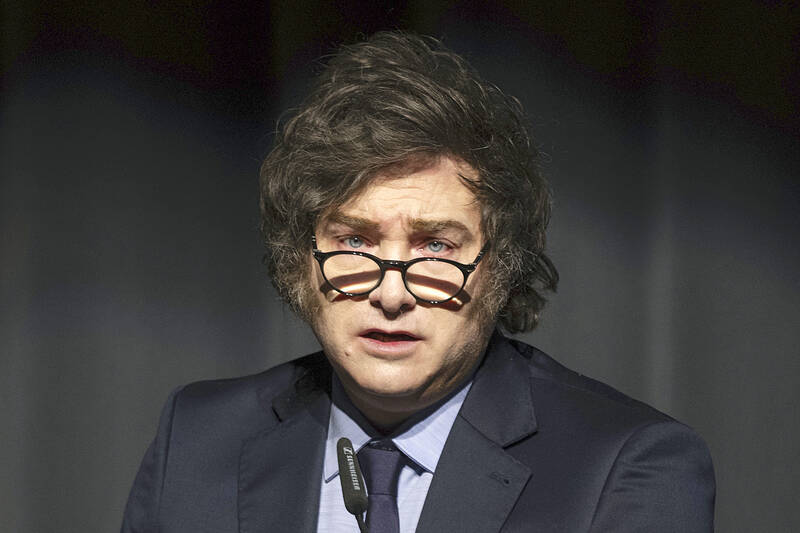Argentina’s president has ordered the country’s withdrawal from the WHO due to “profound differences” with the UN agency, a presidential spokesperson said on Wednesday.
Argentine President Javier Milei’s decision echoes that of his ally, US President Donald Trump, who began the process of pulling the US out of the WHO with an executive order on his first day back in office on Jan. 21.
The loss of another member country would further fracture cooperation in global health, although Argentina was expected to provide only about US$8 million to the WHO for the agency’s estimated US$6.9 billion budget for last year and this year.

Photo: AP
Argentina’s decision is based on “profound differences in health management, especially during the [COVID-19] pandemic,” spokesman Manuel Adorni told a news conference in Buenos Aires.
He said WHO guidelines at the time led to the largest shutdown “in the history of mankind.”
Argentina would not allow an international organization to intervene in its sovereignty “and much less in our health,” he added.
The WHO has no authority to compel countries to take specific health actions, and the organization’s guidelines and recommendations, including in health crises like the COVID-19 pandemic, are often disregarded.
The WHO said it was looking into Argentina’s announcement.
Adorni did not say when Milei’s decision would be implemented. He also said that the WHO lacks independence because of the political influence of some countries, without naming any.
The WHO is the only organization mandated to coordinate global responses to acute health crises, particularly outbreaks of new diseases and persistent threats including Ebola, AIDS and mpox.
Milei was a sharp critic of the lockdown imposed by former Argentine president Alberto Fernandez during the COVID-19 pandemic, asserting that it hurt the economy and that the government used it as a mechanism of “repression.”
“LONG LIVE FREEDOM,” Milei wrote on X on Wednesday criticizing the UN agency.
Argentina does not receive WHO funding for health management, and the president’s decision does not affect the quality of health services, Adorni said.
“On the contrary, it gives greater flexibility to implement policies adopted to the context of interests that Argentina requires,” he added.
Last year, Milei’s government refused to sign an agreement to manage pandemics within the WHO framework, on the grounds that doing so could affect national sovereignty.
The announcement on the WHO comes ahead of Milei’s trip to the US later this month, which coincides with the Conservative Political Action Conference summit of right-wing leaders in Washington.
The spokesperson has not confirmed that Milei would attend or that he might meet Trump.

Incumbent Ecuadoran President Daniel Noboa on Sunday claimed a runaway victory in the nation’s presidential election, after voters endorsed the young leader’s “iron fist” approach to rampant cartel violence. With more than 90 percent of the votes counted, the National Election Council said Noboa had an unassailable 12-point lead over his leftist rival Luisa Gonzalez. Official results showed Noboa with 56 percent of the vote, against Gonzalez’s 44 percent — a far bigger winning margin than expected after a virtual tie in the first round. Speaking to jubilant supporters in his hometown of Olon, the 37-year-old president claimed a “historic victory.” “A huge hug

Two Belgian teenagers on Tuesday were charged with wildlife piracy after they were found with thousands of ants packed in test tubes in what Kenyan authorities said was part of a trend in trafficking smaller and lesser-known species. Lornoy David and Seppe Lodewijckx, two 19-year-olds who were arrested on April 5 with 5,000 ants at a guest house, appeared distraught during their appearance before a magistrate in Nairobi and were comforted in the courtroom by relatives. They told the magistrate that they were collecting the ants for fun and did not know that it was illegal. In a separate criminal case, Kenyan Dennis

A judge in Bangladesh issued an arrest warrant for the British member of parliament and former British economic secretary to the treasury Tulip Siddiq, who is a niece of former Bangladeshi prime minister Sheikh Hasina, who was ousted in August last year in a mass uprising that ended her 15-year rule. The Bangladeshi Anti-Corruption Commission has been investigating allegations against Siddiq that she and her family members, including Hasina, illegally received land in a state-owned township project near Dhaka, the capital. Senior Special Judge of Dhaka Metropolitan Zakir Hossain passed the order on Sunday, after considering charges in three separate cases filed

APPORTIONING BLAME: The US president said that there were ‘millions of people dead because of three people’ — Vladimir Putin, Joe Biden and Volodymyr Zelenskiy US President Donald Trump on Monday resumed his attempts to blame Ukrainian President Volodymyr Zelenskiy for Russia’s invasion, falsely accusing him of responsibility for “millions” of deaths. Trump — who had a blazing public row in the Oval Office with Zelenskiy six weeks ago — said the Ukranian shared the blame with Russian President Vladimir Putin, who ordered the February 2022 invasion, and then-US president Joe Biden. Trump told reporters that there were “millions of people dead because of three people.” “Let’s say Putin No. 1, but let’s say Biden, who had no idea what the hell he was doing, No. 2, and